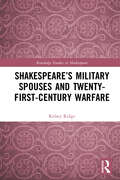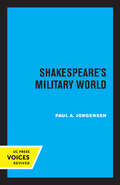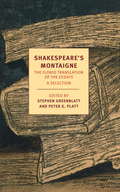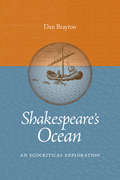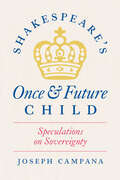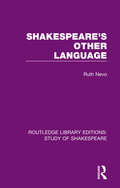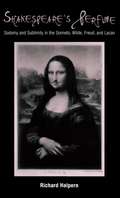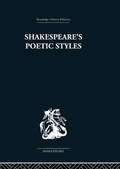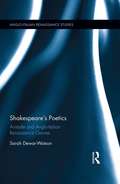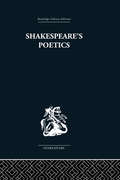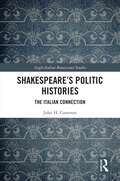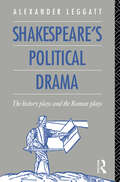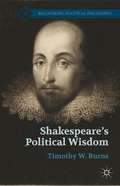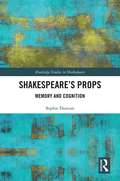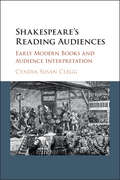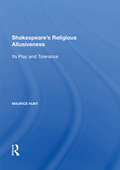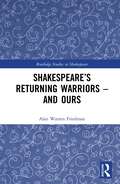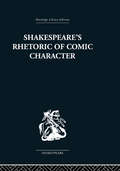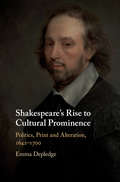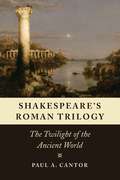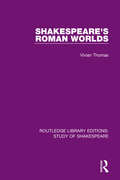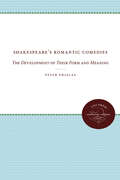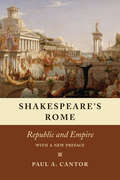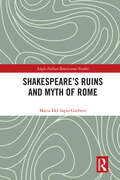- Table View
- List View
Shakespeare’s Military Spouses and Twenty-First-Century Warfare (Routledge Studies in Shakespeare #1)
by Kelsey RidgeThis volume presents a fresh look at the military spouses in Shakespeare’s Othello, 1 Henry IV, Julius Caesar, Troilus and Cressida, Macbeth, and Coriolanus, vital to understanding the plays themselves. By analysing the characters as military spouses, we can better understand current dynamics in modern American civilian and military culture as modern American military spouses live through the War on Terror. Shakespeare's Military Spouses and Twenty-First-Century Warfare explains what these plays have to say about the role of military families and cultural constructions of masculinity both in the texts themselves and in modern America. Concerns relevant to today’s military families – domestic violence, PTSD, infertility, the treatment of queer servicemembers, war crimes, and the growing civil-military divide – pervade Shakespeare’s works. These parallels to the contemporary lived experience are brought out through reference to memoirs written by modern-day military spouses, sociological studies of the American armed forces, and reports issued by the Department of Defence. Shakespeare’s military spouses create a discourse that recognizes the role of the military in national defence but criticizes risky or damaging behaviours and norms, promoting the idea of a martial identity that permits military defence without the dangers of toxic masculinity. Meeting at the intersection of Shakespeare Studies, trauma studies, and military studies, this focus on military spouses is a unique and unprecedented resource for academics in these fields, as well as for groups interested in Shakespeare and theatre as a way of thinking through and responding to psychiatric issues and traumatic experiences.
Shakespeare's Military World
by Paul A. JorgensenThis title is part of UC Press's Voices Revived program, which commemorates University of California Press’s mission to seek out and cultivate the brightest minds and give them voice, reach, and impact. Drawing on a backlist dating to 1893, Voices Revived makes high-quality, peer-reviewed scholarship accessible once again using print-on-demand technology. This title was originally published in 1973.
Shakespeare's Montaigne
by Peter G. Platt Stephen Greenblatt John Florio Michel De MontaigneAn NYRB Classics OriginalShakespeare, Nietzsche wrote, was Montaigne's best reader--a typically brilliant Nietzschean insight, capturing the intimate relationship between Montaigne's ever-changing record of the self and Shakespeare's kaleidoscopic register of human character. And there is no doubt that Shakespeare read Montaigne--though how extensively remains a matter of debate--and that the translation he read him in was that of John Florio, a fascinating polymath, man-about-town, and dazzlingly inventive writer himself.Florio's Montaigne is in fact one of the masterpieces of English prose, with a stylistic range and felicity and passages of deep lingering music that make it comparable to Sir Robert Burton's Anatomy of Melancholy and the works of Sir Thomas Browne. This new edition of this seminal work, edited by Stephen Greenblatt and Peter G. Platt, features an adroitly modernized text, an essay in which Greenblatt discusses both the resemblances and real tensions between Montaigne's and Shakespeare's visions of the world, and Platt's introduction to the life and times of the extraordinary Florio. Altogether, this book provides a remarkable new experience of not just two but three great writers who ushered in the modern world.
Shakespeare's Ocean: An Ecocritical Exploration (Under the Sign of Nature: Explorations in Ecocriticism)
by Dan BraytonStudy of the sea--both in terms of human interaction with it and its literary representation--has been largely ignored by ecocritics. In Shakespeare's Ocean, Dan Brayton foregrounds the maritime dimension of a writer whose plays and poems have had an enormous impact on literary notions of nature and, in so doing, plots a new course for ecocritical scholarship.Shakespeare lived during a time of great expansion of geographical knowledge. The world in which he imagined his plays was newly understood to be a sphere covered with water. In vital readings of works ranging from The Comedy of Errors to the valedictory The Tempest, Brayton demonstrates Shakespeare's remarkable conceptual mastery of the early modern maritime world and reveals a powerful benthic imagination at work.
Shakespeare's Once and Future Child: Speculations on Sovereignty
by Joseph CampanaA study of Shakespeare’s child figures in relation to their own political moment, as well as our own. Politicians are fond of saying that “children are the future.” How did the child become a figure for our political hopes? Joseph Campana’s book locates the source of this idea in transformations of childhood and political sovereignty during the age of Shakespeare, changes spectacularly dramatized by the playwright himself. Shakespeare’s works feature far more child figures—and more politically entangled children—than other literary or theatrical works of the era. Campana delves into this rich corpus to show how children and childhood expose assumptions about the shape of an ideal polity, the nature of citizenship, the growing importance of population and demographics, and the question of what is or is not human. As our ability to imagine viable futures on our planet feels ever more limited, and as children take up legal proceedings to sue on behalf of the future, it behooves us to understand the way past child figures haunt our conversations about intergenerational justice. Shakespeare offers critical precedents for questions we still struggle to answer.
Shakespeare's Other Language (Routledge Library Editions: Study of Shakespeare)
by Ruth NevoShakespeare’s last plays, the tragicomic Romances, are notoriously strange plays, riddled with fabulous events and incredible coincidences, magic and dream. These features have sometimes been interpreted as the carelessness of an of an aging dramatist weary of his craft, or justified as folklore motifs, suitable to the romance tale. But neither view explains the fascination and power these plays still exert. Originally published in 1987, Ruth Nevo’s book offers a reading of the plays which invokes the findings and methods of post-psychoanalytic semiotics. Drawing on a Lacanian model of the "textual unconscious", she embarks on searching analyses of Pericles, Cymbeline, The Winter’s Tale, and The Tempest, brilliantly illuminating their apparent absurdities and anomalies, their bizarre or preposterous events and obscurely motivated actions, their often puzzling syntax. Her investigation of the plays’ informing fantasies produces unified and enriched readings which serve both to rehabilitate those plays which have been less than highly thought of, and to disclose new significance in the acknowledged masterpieces.
Shakespeare's Perfume: Sodomy and Sublimity in the Sonnets, Wilde, Freud, and Lacan
by Richard HalpernStarting with St. Paul's argument that the Greeks were afflicted with homosexuality to punish their excessive love of statues, Richard Halpern uncovers a tradition in which aesthetic experience gives birth to the sexual—and thus reverses the Freudian thesis that erotic desire is sublimated into art. Rather, Halpern argues, sodomy was implicated with aesthetic categories from the very start, as he traces a connection between sodomy and the unrepresentable that runs from Shakespeare's Sonnets to Oscar Wilde's novella The Portrait of Mr. W.H., Freud's famous essay on Leonardo da Vinci, and Jacques Lacan's seminar on the ethics of psychoanalysis. Drawing on theology, alchemy, psychoanalysis, philosophy, and literary criticism, Shakespeare's Perfume explores how the history of aesthetics and the history of sexuality are fundamentally connected.
Shakespeare's Poetic Styles: Verse into Drama
by John BaxterFirst published in 1980. At their most successful, Shakespeare's styles are strategies to make plain the limits of thought and feeling which define the significance of human actions. John Baxter analyses the way in which these limits are reached, and also provides a strong argument for the idea that the power of Shakespearean drama depends upon the co-operation of poetic style and dramatic form. Three plays are examined in detail in the text: The Tragedy of Mustapha by Fulke Greville and Richard II and Macbeth by Shakespeare.
Shakespeare's Poetics: Aristotle and Anglo-Italian Renaissance Genres (Anglo-Italian Renaissance Studies)
by Sarah Dewar-WatsonThe startling central idea behind this study is that the rediscovery of Aristotle's Poetics in the sixteenth century ultimately had a profound impact on almost every aspect of Shakespeare's late plays”their sources, subject matter and thematic concerns. Shakespeare's Poetics reveals the generic complexity of Shakespeare's late plays to be informed by contemporary debates about the tonal and structural composition of tragicomedy. Author Sarah Dewar-Watson re-examines such plays as The Winter's Tale, Pericles and The Tempest in light of the important work of reception which was undertaken in Italy by pioneering theorists such as Giambattista Giraldi Cinthio (1504-73) and Giambattista Guarini (1538-1612). The author demonstrates ways in which these theoretical developments filtered from their intellectual base in Italy to the playhouses of early modern England via the work of dramatists such as Jonson and Fletcher. Dewar-Watson argues that the effect of this widespread revaluation of genre not only extends as far as Shakespeare, but that he takes a leading role in developing its possibilities on the English stage. In the course of pursuing this topic, Dewar-Watson also engages with several areas of current scholarly debate: the nature of Shakespeare's authorship; recent interest in and work on Shakespeare's later plays; and new critical work on Italian language-learning in Renaissance England. Finally, Shakespeare's Poetics develops current critical thinking about the place of Greek literature in Renaissance England, particularly in relation to Shakespeare.
Shakespeare's Poetics: In relation to King Lear
by Russell A FraserFirst published in 1962. This volume gives as complete an account as possible of the Shakespearian experience, particularly in terms of one play, King Lear, but in general against the context of all of Shakespeare's work and that of the age in which it was created. Chapters cover: King Lear in the Renaissance; Providence; Kind; Fortune; Anarchy and Order; Reason and Will; Show and Substance; Redemption and Shakespeare's Poetics.
Shakespeare’s Politic Histories: The Italian Connection (Anglo-Italian Renaissance Studies)
by John H. CameronThis book argues that Shakespeare's first tetralogy is informed by the Italian ‘politic histories’ of the early modern period, those works of history, inspired by the Roman historian Tacitus, that sought to explore the machinations of power politics in governance and in the shaping of historical events; that a close reading of these Italian ‘politic histories’ will greatly aid our understanding of the ‘politic’ qualities dramatized in Shakespeare’s early English History plays; that the writings of Niccolò Machiavelli in particular will likewise aid to such understanding; that these ‘politic histories’ were available (in a variety of forms) to many English early modern writers, Shakespeare included, and are thus helpful as grounds for political and strategic analogy and for informing our reading of Shakespeare's politic histories. While a reading of the Italian ‘politic’ historians can aid in our understanding of Shakespeare’s achievement, we should regard the English History plays as ‘politic histories’ in their own right, i.e. as dramatized versions of precisely the same kinds of ‘politic’ historical writing, with its emphasis on ragion di Stato or raison d’état. This emphasis on what the Elizabethans called ‘stratagems’ suggests new ways to read the plays and to interpret the motivation and action of its characters, ways that challenge some of our more established reading of the plays’ ‘Machiavellian’ characters (particularly Richard III) and suggest far greater strategic acumen on the part of previously overlooked characters (particularly Buckingham and Stanley), providing new ways to read the Shakespeare's politic histories and to better appreciate their Italian connection.
Shakespeare's Political Drama: The History Plays and the Roman Plays
by Alexander LeggattFirst published in 1989. Routledge is an imprint of Taylor & Francis, an informa company.
Shakespeare’s Political Wisdom
by Timothy W. BurnsWinner of 2014 CHOICE Outstanding Academic Title Award, Shakespeare's Political Wisdom offers careful interpretations of five Shakespearean plays –Julius Caesar, Macbeth, The Merchant of Venice, King Lear, and The Tempest–with a view to the enduring guidance those plays can provide to human, political life. The plays have been chosen for their relentless attention to the questions that, for Shakespeare, form the heart and soul of politics: Who should rule, and what is justice? Burns provides an original reading of the plays through the lens of political philosophy rather than Theatre or Renaissance Studies. Shakespeare's wisdom found in these five plays, Burns concludes, provides a deeply relevant critique of our contemporary civic culture.
Shakespeare's Possible Worlds
by Simon PalfreyNew methods are needed to do justice to Shakespeare. His work exceeds conventional models, past and present, for understanding playworlds. In this book, Simon Palfrey goes right to the heart of early modern popular drama, revealing both how it works and why it matters. Unlike his contemporaries, Shakespeare gives independent life to all his instruments, and to every fraction and fragment of the plays. Palfrey terms these particles 'formactions' - theatre-specific forms that move with their own action and passion. Palfrey's book is critically daring in both substance and format. Its unique mix of imaginative gusto, thought experiments, and virtuosic technique generates piercing close readings of the plays. There is far more to playlife than meets the eye. Influenced by Leibniz's visionary original model of possible worlds, Palfrey opens up the multiple worlds of Shakespeare's language, scenes, and characters as never before.
Shakespeare’s Props: Memory and Cognition (Routledge Studies in Shakespeare)
by Sophie DuncanCognitive approaches to drama have enriched our understanding of Early Modern playtexts, acting and spectatorship. This monograph is the first full-length study of Shakespeare’s props and their cognitive impact. Shakespeare’s most iconic props have become transhistorical, transnational metonyms for their plays: a strawberry-spotted handkerchief instantly recalls Othello; a skull Hamlet. One reason for stage properties’ neglect by cognitive theorists may be the longstanding tendency to conceptualise props as detachable body parts: instead, this monograph argues for props as detachable parts of the mind. Through props, Shakespeare’s characters offload, reveal and intervene in each other’s cognition, illuminating and extending their affect. Shakespeare’s props are neither static icons nor substitutes for the body, but volatile, malleable, and dangerously exposed extensions of his characters’ minds. Recognising them as such offers new readings of the plays, from the way memory becomes a weapon in Hamlet’s Elsinore, to the pleasures and perils of Early Modern gift culture in Othello. The monograph illuminates Shakespeare’s exploration of extended cognition, recollection and remembrance at a time when the growth of printing was forcing Renaissance culture to rethink the relationship between memory and the object. Readings in Shakespearean stage history reveal how props both carry audience affect and reveal cultural priorities: some accrue cultural memories, while others decay and are forgotten as detritus of the stage.
Shakespeare's Reading Audiences: Early Modern Books and Audience Interpretation
by Cyndia Susan CleggThis study grows out of the intersection of two realms of scholarly investigation - the emerging public sphere in early modern England and the history of the book. <P><P>Shakespeare's Reading Audiences examines the ways in which different communities - humanist, legal, religious and political - would have interpreted Shakespeare's plays and poems, whether printed or performed. <P>Cyndia Susan Clegg begins by analysing elite reading clusters associated with the Court, the universities, and the Inns of Court and how their interpretation of Shakespeare's Sonnets and Henry V arose from their reading of Italian humanists. <P><P>She concludes by examining how widely held public knowledge about English history both affected Richard II's reception and how such knowledge was appropriated by the State. <P>She also considers The Merry Wives of Windsor, Henry V, and Othello from the point of view of audience members conversant in popular English legal writing and Macbeth from the perspective of popular English Calvinism.
Shakespeare's Religious Allusiveness: Its Play and Tolerance (Shakespeare Studies)
by Maurice HuntShakespeare's Religious Allusiveness complicates debates about whether Shakespeare's plays are fundamentally Protestant or Catholic in sympathy, challenging analyses that either find Protestant elements consistently undercutting Catholic motifs or, less often, discover evidence of the playwright's endorsement of Catholic doctrine and customs. Rather, Maurice Hunt argues that Shakespeare's syncretistic method of incorporating both Protestant and Catholic elements into his plays was singular among early modern English playwrights at a time when governmental and social tolerance of Protestantism in the theatre was high and criticism of stereotyped Catholicism was correspondingly rampant in drama. In-depth discussions of The Two Gentlemen of Verona, the Second Henriad, All's Well That Ends Well, Twelfth Night, and Othello reveal how Shakespeare allusively integrates Reformation Protestant and Roman Catholic motifs and systems of thought. This book sheds new light on the playwright's knowledge of and interest in Elizabethan and Jacobean religious debates over the nature of spiritual reformation, the efficacy of merit for redemption, and the operation of Providence. It will appeal not only to Shakespeare scholars but to those interested in the cultural history of the Reformation.
Shakespeare’s Returning Warriors – and Ours (Routledge Studies in Shakespeare)
by Alan Warren FriedmanShakespeare’s Returning Warriors – and Ours takes its primary inspiration from the contemporary U.S. Post-Traumatic Stress Disorder (PTSD) crisis in soldiers transitioning from battlefields back into society. It begins by examining how ancient societies sought to ease the return of soldiers in order to minimize PTSD, though the term did not become widely used until the early 1980s. It then considers a dozen or so Shakespearean plays that depict such transitions at the start, focusing on the tragic protagonists and antagonists in paradigmatic "returning warrior" plays, including Titus Andronicus, Julius Caesar, Othello, Macbeth, Antony and Cleopatra, and Coriolanus, and exploring the psychological and emotional ill-fits that prevent warrriors from returning to the status quo ante after battlefield triumphs, or even surviving the psychic demons and moral disequilibrium they unleash on their domestic settings and themselves. It also analyzes the history plays, several comedies, and Hamlet as plays that partly conform to and also significantly deviate from the basic paradigm. The final chapter discusses recent attempts to effect successful transitions, often using Shakespeare’s plays as therapy, and depictions of attempts to wage warfare without inducing PTSD. Through the investigation of the tragedies and model returning warrior experiences, Shakespeare’s Returning Warriors – and Ours highlights a central and understudied feature of Shakespeare’s plays and what they can teach us about PTSD today when it is a widespread phenomenon in American society.
Shakespeare's Rhetoric of Comic Character: Dramatic Convention In Classical And Renaissance Comedy
by Karen NewmanFirst published in 1985. In this revisionist history of comic characterization, Karen Newman argues that, contrary to received opinion, Shakespeare was not the first comic dramatist to create self-conscious characters who seem 'lifelike' or 'realistic'. His comic practice is firmly set within a comic tradition which stretches from Plautus and Menander to playwrights of the Italian Renaissance.
Shakespeare's Rise to Cultural Prominence: Politics, Print and Alteration, 1642–1700
by Emma DepledgeShakespeare's rise to prominence was by no means inevitable. While he was popular in his lifetime, the number of new editions and revivals of his plays declined over the following decades. Emma Depledge uses the methodologies of book and theatre history to provide a re-assessment of the reputation and dissemination of Shakespeare during the Interregnum and Restoration. She demonstrates the crucial role of the Exclusion Crisis (1678–1682), a political crisis over the royal succession, as a foundational moment in Shakespeare's canonisation. The period saw a sudden surge of theatrical alterations and a significantly increased rate of new editions and stage revivals. In the wake of the Exclusion Crisis, Shakespeare's plays were made available on a scale not witnessed since the early seventeenth century, thus reversing what might otherwise have been a permanent disappearance of his drama from canonical familiarity and firmly establishing Shakespeare's work in the national cultural imagination.
Shakespeare's Roman Trilogy: The Twilight of the Ancient World
by Paul A. CantorPaul A. Cantor first probed Shakespeare’s Roman plays—Coriolanus, Julius Caeser, and Antony and Cleopatra—in his landmark Shakespeare’s Rome (1976). With Shakespeare’s Roman Trilogy, he now argues that these plays form an integrated trilogy that portrays the tragedy not simply of their protagonists but of an entire political community. Cantor analyzes the way Shakespeare chronicles the rise and fall of the Roman Republic and the emergence of the Roman Empire. The transformation of the ancient city into a cosmopolitan empire marks the end of the era of civic virtue in antiquity, but it also opens up new spiritual possibilities that Shakespeare correlates with the rise of Christianity and thus the first stirrings of the medieval and the modern worlds. More broadly, Cantor places Shakespeare’s plays in a long tradition of philosophical speculation about Rome, with special emphasis on Machiavelli and Nietzsche, two thinkers who provide important clues on how to read Shakespeare’s works. In a pathbreaking chapter, he undertakes the first systematic comparison of Shakespeare and Nietzsche on Rome, exploring their central point of contention: Did Christianity corrupt the Roman Empire or was the corruption of the Empire the precondition of the rise of Christianity? Bringing Shakespeare into dialogue with other major thinkers about Rome, Shakespeare’s Roman Trilogy reveals the true profundity of the Roman Plays.
Shakespeare’s Roman Worlds (Routledge Library Editions: Study of Shakespeare)
by Vivian ThomasThe ‘infinite variety’ of Shakespeare’s Roman plays is reflected in the diversity of critical commentary to which they have given rise. Originally published in 1989, the distinguishing feature of this study is that it endeavours to convey a clear idea of the relationship between the characters and events in Shakespeare’s plays and the main narrative sources on which the four Roman plays are based, while simultaneously undertaking a critical analysis of the plays through the perspective of Shakespeare’s Roman worlds, particularly the creation and operation of the value system. Hence these plays are perceived as political plays, histories and tragedies.
Shakespeare's Romantic Comedies: The Development of Their Form and Meaning
by Peter G. PhialasPhialas provides commentaries on Shakespeare's romantic comedies, treats in detail individual scenes and characters, and makes illuminating comparisons and contrasts of character with character. The chief concern of the book is with the action of each play, the nature and relationship of its parts, and the meaning that the action dramatizes.Originally published in 1966.A UNC Press Enduring Edition -- UNC Press Enduring Editions use the latest in digital technology to make available again books from our distinguished backlist that were previously out of print. These editions are published unaltered from the original, and are presented in affordable paperback formats, bringing readers both historical and cultural value.
Shakespeare's Rome: Republic and Empire
by Paul A. CantorFor more than forty years, Paul Cantor’s Shakespeare’s Rome has been a foundational work in the field of politics and literature. While many critics assumed that the Roman plays do not reflect any special knowledge of Rome, Cantor was one of the first to argue that they are grounded in a profound understanding of the Roman regime and its changes over time. Taking Shakespeare seriously as a political thinker, Cantor suggests that his Roman plays can be profitably studied in the context of the classical republican tradition in political philosophy. In Shakespeare’s Rome, Cantor examines the political settings of Shakespeare’s Roman plays, Coriolanus and Antony and Cleopatra, with references as well to Julius Caesar. Cantor shows that Shakespeare presents a convincing portrait of Rome in different eras of its history, contrasting the austere republic of Coriolanus, with its narrow horizons and martial virtues, and the cosmopolitan empire of Antony and Cleopatra, with its “immortal longings” and sophistication bordering on decadence.
Shakespeare’s Ruins and Myth of Rome (Anglo-Italian Renaissance Studies)
by Maria Del Sapio GarberoRome was tantamount to its ruins, a dismembered body, to the eyes of those – Italians and foreigners – who visited the city in the years prior to or encompassing the lengthy span of the Renaissance. Drawing on the double movement of archaeological exploration and creative reconstruction entailed in the humanist endeavour to ‘resurrect’ the past, ‘ruins’ are seen as taking precedence over ‘myth’, in Shakespeare’s Rome. They are assigned the role of a heuristic model, and discovered in all their epistemic relevance in Shakespeare’s dramatic vision of history and his negotiation of modernity. This is the first book of its kind to address Shakespeare’s relationship with Rome’s authoritative myth, archaeologically, by taking as a point of departure a chronological reversal, namely the vision of the ‘eternal’ city as a ruinous scenario and hence the ways in which such a layered, ‘silent’, and aporetic scenario allows for an archaeo-anatomical approach to Shakespeare’s Roman works.
